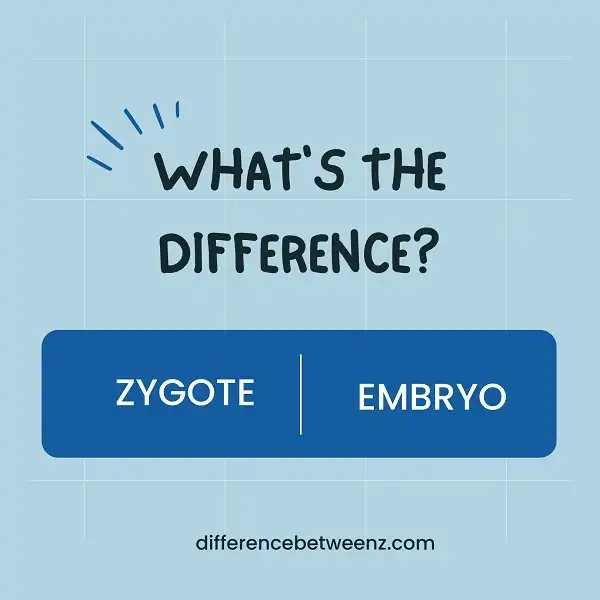The terms “zygote” and “embryo” are often used interchangeably, but they actually have different meanings. The zygote is the first stage of development after fertilization, while the embryo is the second stage. In this post, we’ll take a closer look at the differences between these two stages of development.
What is Zygote?
A zygote is a eukaryotic cell formed by the union of two gametes, typically egg and sperm. After fertilization, the zygote’s cells rapidly begin to divide and differentiate into the various tissues of the embryo. The term zygote is derived from Greekζυγος (zygōs), meaning “yoked” or “joined”. The zygote is the initial cell from which an organism will develop, and contains all of its genetic material. In many cases, the zygote will undergo multiple cell-division cycles (cleavage), producing a ball of cells known as a blastula that will later develop into a mature organism. However, in some organisms, such as certain plants and fungi, the zygote will undergo immediate cell differentiation, with little or no cell division occurring. Regardless of the mechanism, all organisms begin as a single cell: the zygote.
What is Embryo?
- An embryo is an early stage of development for a baby. In humans, this stage of development begins after fertilization, when the egg is fertilized by the sperm. The embryo then begins to grow and develop, eventually becoming a fetus. During the embryonic stage, the baby’s brain, heart, and other organs begin to form. The baby also starts to develop its own unique DNA.
- The prenatal stage begins after the eighth week of gestation and lasts until the baby is born. This is a time of rapid growth and development, as the baby’s organs continue to develop and mature.
- After birth, the baby enters the postnatal stage, which lasts until it reaches adulthood. During this time, the baby continues to grow and develop, both physically and mentally.
- Embryos are very sensitive during all stages of development. They are especially vulnerable during the earliest stages of development before many of their organs have even begun to form. That is why it is so important for women to receive proper medical care during pregnancy. proper medical care can help ensure that both the mother and the child remain healthy throughout pregnancy and beyond.
Difference between Zygote and Embryo
- The terms zygote and embryo refer to different stages in the development of a fetus. A zygote is a fertilized egg, and it is the earliest stage of development. The zygote contains all of the genetic information needed to develop into a baby.
- An embryo is the next stage of development, and it starts when the zygote begins to divide into cells. The embryo grows and develops inside the mother’s womb, and it typically arrives nine months after conception.
- To sum up, a zygote is a fertilized egg that has not yet started to divide, while an embryo is a developing fetus that has begun to divide into cells.
Conclusion
In conclusion, the zygote is the first stage of development after fertilization. The embryo is the second stage and is considered to be a human being. There are many ethical considerations surrounding embryonic stem cell research, and it is an important topic to consider when discussing bioethics.


